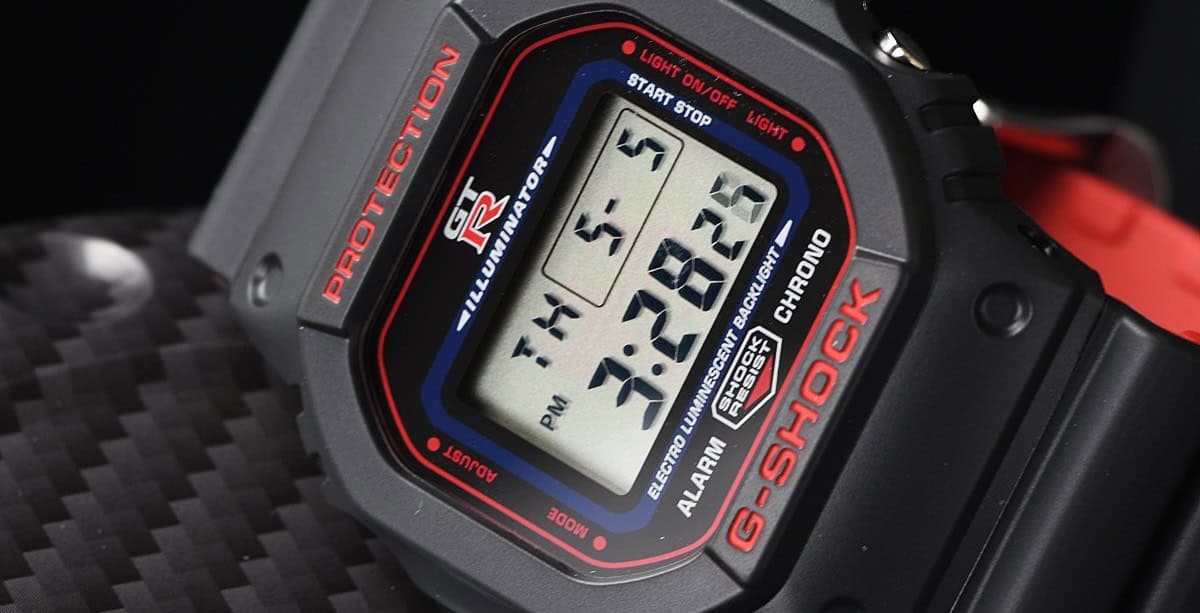In a new collaborative effort, Casio has unveiled the G-SHOK DW-5600, dedicated to celebrating the revered Nissan GT-R. This marks the sixth time Casio has partnered with Nissan Japan, showcasing a shared passion for innovation and design.
The G-SHOCK DW-5600 exudes a modern and sleek presentation with its matte black finish, complemented by matching black buttons and buckle. The distinctive GT-R logo embellishes the display, infusing the piece with an exclusive flair that is certain to appeal to car enthusiasts and watch collectors alike.
In terms of features, the watch is outfitted with hallmark G-SHOCK functionalities such as an electroluminescent backlight for clear visibility, a stopwatch with precise 1/100 second accuracy, and a robust water resistance capable of withstanding depths up to 200 meters. Users will also appreciate the 24-hour countdown timer, an automatic calendar, and an alarm clock, making it both stylish and practical.
This special edition timepiece will come in a uniquely designed package—a tin case adorned with the GT-R emblem—and features a durable polymer strap. Launching on October 17, the watch will be available at Nissan dealers across Japan, retailing at ¥19,800, roughly equivalent to $133.
Casio’s commitment to blending contemporary style with cutting-edge technology continues with its ongoing introduction of other exciting models, broadening its G-SHOCK lineup for diverse tastes.
The Impact of Wearable Technology on Modern Life
In recent years, wearable technology has transformed from niche devices into essential tools for enhancing daily life. As these innovative gadgets become more ingrained in our routines, they significantly affect individuals, communities, and even countries. This evolution is not without its controversies, which make wearables a fascinating topic of discussion.
Revolutionizing Personal Health Management
Wearables like fitness trackers and smartwatches have revolutionized how people monitor their health. With the ability to track heart rate, steps, sleep patterns, and more, these devices empower users to take proactive measures in maintaining and improving their health. According to the World Health Organization, daily physical activity is crucial for preventing lifestyle-related diseases, and wearables provide a convenient way to achieve this.
Wearables in the Workplace
Beyond personal health, wearables are making significant inroads into professional settings. Companies are increasingly utilizing smart devices to monitor employee well-being, productivity, and safety. For example, construction firms equip workers with smart helmets to monitor vital signs and detect fatigue, enhancing safety on dangerous job sites. However, this introduces privacy concerns, as employees may feel uncomfortable with constant monitoring.
Enhancing Communication and Connectivity
Wearable technology enhances communication by delivering notifications and messages directly to users without needing to access their phones. This seamless integration into daily life allows for better connectivity and can be especially valuable in remote work settings. However, there is an ongoing debate about whether this constant connectivity leads to digital burnout, further blurring the lines between work and personal life.
Impacts on National Health Systems
At a national level, aggregate data from wearable devices can provide health officials with insights into public health trends. This can improve healthcare strategies and policies, potentially reducing costs and improving outcomes. However, this raises questions about data security and privacy. Governments and tech companies must work closely to ensure data is handled ethically and transparently.
Economic Considerations
The wearable tech industry is booming, with forecasts predicting continued growth. As a result, countries investing in this sector can benefit economically. However, this growth also presents challenges, such as e-waste management and ensuring equitable access to these potentially life-enhancing devices.
For those interested in exploring more about wearable technology and its implications, resources such as World Health Organization and International Labour Organization provide valuable information on related topics.
In conclusion, wearable technology is a double-edged sword. While it offers numerous benefits for personal health, workplace efficiency, and national healthcare systems, it also raises ethical concerns about privacy and data security. As the industry continues to evolve, addressing these controversies will be crucial to maximizing the positive impact of wearables on society.
The article has been updated. 2024-11-02 04:30
Here are some suggested related links:
1. Garmin – Explore innovative GPS technology and watch options for fitness enthusiasts who appreciate style and precision.
2. Nissan GT-R Official – The official website for Nissan GT-R enthusiasts, showcasing the latest models, news, and community events.
3. ABC Watch Review – A comprehensive resource for watch reviews, including features on iconic timepieces like the G-SHOCK series.
4. CarsGuide – An automotive news platform providing insights, reviews, and updates on the latest car trends, including the Nissan GT-R.
5. G-SHOCK – Visit the official G-SHOCK website to discover the latest releases and innovations in the renowned watch line.
6. MotorTrend – Stay updated on all things automotive with reviews, news, and features focusing on performance cars like the Nissan GT-R.
7. Autoblog – A popular automotive news site offering insights into car reviews, industry news, and updates on iconic models including the GT-R.
8. Times – Explore articles and reviews covering automotive trends and advancements, with occasional features on iconic vehicles like the Nissan GT-R.
Each of these links provides additional context or relevant information associated with the G-SHOCK DW-5600 watch and the Nissan GT-R.
The article has been updated. 2024-11-03 13:38
What features make the Casio G-SHOCK DW-5600 a fitting tribute to the iconic Nissan GT-R?
The Casio G-SHOCK DW-5600 features a unique design inspired by the Nissan GT-R, incorporating elements such as a sleek black color scheme and red accents reminiscent of the car’s signature look. The watch also boasts robust durability, much like the GT-R’s performance on the road, with a shock-resistant structure and water resistance of up to 200 meters. Additionally, the DW-5600 includes custom GT-R branding and special packaging that celebrates the legacy of the Nissan GT-R, making it not just a timepiece but also a collector’s item for enthusiasts of both G-SHOCK and the famed sports car.







